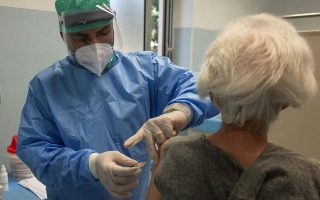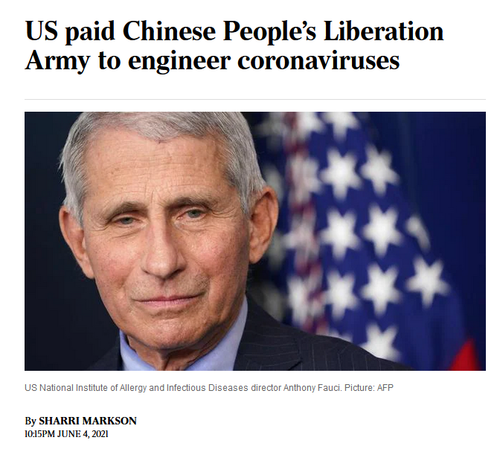Meet The Censored: Bret Weinstein
Authored by Matt Taibbi via TK News,
On May 23, 2017, not so long ago in real time but seemingly an eternity given the extraordinary history we’ve lived through since, a group of 50-odd students at Evergreen State College arrived at the classroom of a biology professor named Bret Weinstein, demanding his resignation. He stepped into the hall to talk, believing he could work things out.
He was wrong. Weinstein’s offense had been to come to work during an event called the “Days of Absence,” in which white students, staff, and faculty were asked to stay home. This was an inverted version of a longstanding Evergreen event of the same name that, based on a Douglas Turner Ward play, invited students of color to stay home voluntarily, to underscore their value to the community. As he would later explain in the Wall Street Journal, Weinstein thought this was a different and more negative message, and refused to comply. When that group of 50 students he’d never met arrived at his door and accused him of being a racist, he assumed he could find common ground, especially when his own students (including students of color) spoke on his behalf.
“I was one of Evergreen’s most popular professors,” he later testified to the House of Representatives. “I had Evergreen’s version of tenure. Did they really think they could force my resignation based on a meritless accusation? They did think that, and they were right.”
Weinstein was a Bernie Sanders supporter who described his politics as unabashedly liberal, even leftist. Like many, he’d grown up steeped in the imagery of sixties protest culture, probably imagined himself on its side, and therefore thought he could find solidarity with protesters. He didn’t realize was that he was the canary in a coal mine for a new movement that understood free speech as a stalking horse for the exercise of institutional power. When Weinstein opened his mouth to defend himself, what the crowd heard was him attempting to exercise authority, and they exercised theirs back.
They’d won over Evergreen’s new president, George Bridges, who refused to intercede in Weinstein’s behalf and later even asked college police to stand down, when protesters began stopping traffic and searching cars for someone, presumably Weinstein. The police told Weinstein they couldn’t guarantee his safety, and ultimately he was, in fact, forced to resign.
Frequently portrayed as the involuntary protagonist of the first of a series of campus free speech crises, in fact Weinstein was one of the first to understand that a rollback of “free speech” in cases like his was incidental to the larger aims of the movement.
“What is occurring on college campuses is about power and control. Speech is impeded as a last resort,” he told the House Oversight Committee.
He described the new movement as like a cult, in which members sincerely believed they were acting to stop oppression, but leaders understood they were simply “turning the tables” on oppression. They were exercising authority to achieve what may be presented as social justice goals, while the actual end is the authority itself, with the teardown of due process and other protections a critical part of the picture. “This committee,” he said, “should take my tale as cautionary.”
Fast forward three years. Weinstein and his wife Heather Heying have become prominent figures in independent media, co-hosting a popular podcast called DarkHorse. Identified in the New York Times as one of the main dramatis personae of the so-called “Intellectual Dark Web,” a group of heterodox intellectuals not aligned with the traditional right or left, he appeared for a time to find a home on YouTube. Maybe he would never go back to academia, but this seemed a more secure replacement. After all it’s one thing to be dependent on the whims of a college president or even a faculty board, but surely there’s safety in subscriber numbers?
Not so fast. As detailed in “Why Has ‘Ivermectin’ Become a Dirty Word?”, Weinstein is on the verge of becoming one of the more prominent casualties to a censorship movement that it’s hard not to see as part of a wider Evergreening of America. He and Heying’s two YouTube channels have been hit with multiple warnings for two brands of speech offenses, and are on the verge of having their business shut down entirely as a result (YouTube has a “three strikes and you’re out” policy). One offense involves interviews with the likes of Dr. Pierre Kory about the potential benefits of the repurposed drug ivermectin, and the other involves interviews with guests like Dr. Robert Malone, inventor of the mRNA vaccine technology used in the Covid-19 vaccines. One video with Malone this week had 587,331 views before it was shut down.
In the years since Weinstein left Evergreen, the American cultural and political establishment has undergone a change in thinking, tracking with the warning Weinstein delivered to congress. The Trump election inspired a loss of faith in democracy, Charlottesville defamed speech rights, and Russiagate was an ongoing argument against due process, with many of the same people who opposed Dick Cheney’s spy state suddenly seeing themselves as aligned with the FBI, the NSA, and the CIA in the war on Trump.
Weinstein in his testimony talked about a movement that targeted the liberal concepts that traditionally bound us together, one being the “marketplace of ideas.” By 2021, the “marketplace of ideas” was regularly being portrayed as a trick, a tool for repression designed to conceal the fact that, as the New York Times put it last year, “good ideas do not always triumph in a marketplace of ideas.”
Thus instead of argument and debate, many now believe we should use force and influence to achieve objectives. This is just what Weinstein described at Evergreen: eschewing argument, accumulating power for its own sake instead. It’s in light of this cultural shift that we’ve seen a movement in favor of censorship, with erstwhile opponents of corporations posturing as libertarians, filling social media with arguments about how private companies should be free to do what they want.
When Facebook, Apple, YouTube and Spotify teamed up to kick Alex Jones off the Internet in the summer of 2018, most of the left cheered. The obvious fear, however, was that moderators would develop mission creep. The DarkHorse incidents show we’re there. Whether or not one agrees with Weinstein about the efficacy of ivermectin, or the idea that the Covid-19 vaccines carry unreported dangers, anyone who follows his show recognizes that his is nearly the opposite of an Alex Jones act. He and Heying’s shows are neither frivolous nor abusive, and they clearly make an effort to be evidence-based, interviewing credentialed authorities, typically about subjects ignored by the corporate press.
This is exactly what independent/alternative media is for: tackling third rail subjects that, for one reason or another, can’t find a home in traditional media. Often, it takes scoops initially dismissed as silly conspiracies by what ABC reporter Jon Karl recently described as “serious people,” a classic example being Gary Webb’s famous CIA cocaine trafficking story.
A Time magazine editor in rejecting that one told reporters on that “if this story were about the Sandinistas and drugs, you’d have no trouble getting it in the magazine,” while Newsweek years later called a U.S. Senator, John Kerry, a “randy conspiracy buff” for saying the Contras in Nicaragua were engaged in drug trafficking. Only years later, in the small San Jose Mercury-News, did the story come out, and even then it took years before the coke-for-guns tale truly broke through in popular media.
With the Covid-19 story, Weinstein and Heying were among the first to openly consider the so-called “lab leak hypothesis” of how the pandemic began. In fact, in the days before people like Dr. Anthony Fauci appeared to change their minds about the theory’s feasibility, and before beloved mainstream figures like Jon Stewart declared that if there was “an outbreak of chocolatey goodness near Hershey, Pennsylvania” you’d know “it’s the fucking chocolate factory,” Weinstein and Heyer were roundly denounced as Covid-19 misinformation peddlers.
In January, after they went on Real Time With Bill Maher, they were blasted for pushing a “Steve Bannon Wuhan Lab Covid Conspiracy” by a Daily Beast writer who mostly seemed upset that Weinstein and Heying had soiled Maher with the ick of unconventional thinking. However, since conventional wisdom on the lab leak theory changed, criticism on that front has died down, especially now that platforms like Facebook have announced they “will no longer remove the claim that COVID-19 is man-made or manufactured from our apps.” Still, the shift in consensus thinking about lab origin has only seemed to accelerate the vigilance about ivermectin and other issues.
This is a significant moment in the history of American media. If a show with the audience that Weinstein and Heying have can be put out of business this easily, it means that independent media going forward will either have to operate outside the major Internet platforms, or give up its traditional role as a challenger of mainstream narratives. There are plenty of people out there who take a sarcastic view of the “Intellectual Dark Web,” just as they roll their eyes at lots of YouTubers or Instagram stars or even the “Substackerati,” but even those critics should realize the seriousness of this moment, not just for this show, but for all media.
I reached out to Weinstein about his fight with YouTube:
TK: Can you sketch out the structure of your media business?
Weinstein: Heather and I have been doing livestreams since March, 2020. They began as bi-weekly and were originally focused on COVID. The topic quickly broadened, and streams were reduced to once a week in September, 2020. We have done 83 livestreams as of June 5th. Livestreams consist of 1-2 hours of presentation and discussion between Heather and Bret, followed by 1-2 hours of audience Q and A.
The remainder of the podcasts are discussions between me, Bret, and one or more guests. Some have been done in studio, others over zoom. The maximum number of guests was The Black Intellectual Round Table with seven guests. All guest discussions have been taped, with two recent exceptions (with Pierre Kory, and Steve Kirsch/Robert Malone), and generally the content is not edited with respect to substance. The main channel has 329,000 subscribers. Revenue on the main channel is generated by YouTube ads at the beginning of the podcast, by Superchat questions, and recently we have done spoken ads for carefully chosen sponsors. Podcasts also drive subscribership on each of our Patreon pages, and channel/podcast merchandise is also available from Teespring linked through YouTube.
The clips channel was created in July 2020, and consists of clips made by a video editor/producer who watches our podcasts and selects highlights. Subscribership on the clips channel is rapidly growing and stands at 182,000. All revenue on the clips channel is from YouTube ads.
The main livestreams (but not the Q&As), and the podcasts that I have with other guests, are also uploaded to audio-only podcast platforms. Combining YouTube and podcast downloads, episodes tend to get above 200,000 views/listens each. The audio-only podcast has reliably been in the top 10 in Apple’s “Science podcasts” category, and goes in and out of top 100 in “overall” podcasts. Currently it is #77.
TK: Tech company executives have consistently said they intervene on this subject only for safety reasons, to prevent misleading information that might cause someone to avoid a lifesaving treatment. What is your answer to that? Are you an anti-vaxxer? Could a reasonable person infer from your broadcasts that you're recommending that adults not get vaccinated?
Weinstein: We are biologists engaging material that is inherently evolutionary. Our upcoming book is on the problem caused by the interface of people with novel technology for which we are not evolutionarily prepared. No one is trained in even a majority of the disciplines relevant to the COVID Pandemic. Virologists aren’t clinicians, aren’t epidemiologists, aren’t evolutionary biologists, aren’t pharmacologists, aren’t data scientists. We state repeatedly that we are not medical doctors and are not making recommendations, but we are sharing our view of scientific material that we are qualified to analyze.
It is true that some may become hesitant about the Covid vaccines from our discussions. That may cost lives, as we have taken pains to point out repeatedly. We also surely save lives. For example, it is especially likely that DarkHorse viewers who have had COVID would skip being vaccinated, greatly reducing their risk of adverse reactions without increasing their risk of future COVID.
The question is one of net effect. We have been way ahead of official guidance throughout the pandemic, and we have been very sharp in our criticism of those who have treated SARS-CoV2 casually. We have clearly sobered many up about the issue. Our refrain has been that although the case fatality rate from COVID is moderate, the damage to the body from a case of COVID—even if mild—is often substantial and likely implies reduced longevity. And we have given prescient advice on prevention. We were extremely early in recognizing that conducting business outside, opening windows (especially in cars), keeping conversation with strangers brief, wearing masks, removing masks outside, spending time in the sun, supplementing with vitamin-D, all have protective effects.
The best defense of what we have done on DarkHorse is simply to compare our prevention model with the official guidance. It is the low quality and slow improvement in the official model that constitutes the greatest danger. It takes far too long for official guidance to catch up to the evidence.
As to the questions of whether we are vaccinated and/or would get vaccinated again: we (and our children) are more fully vaccinated than most people, in part due to the exposures that our (former) jobs as tropical biologists gave us. We are, for instance, vaccinated against yellow fever, typhoid, and rabies. We are not vaccinated against Covid, and do not intend to get vaccinated against Covid (unless, perhaps, a traditional vaccine were to be produced).
TK: Jon Stewart made the lab-leak hypothesis mainstream last week. You were one of the first media figures to try to bring attention in that direction. What was the response when you raised your own concerns, and what's your reaction now, given the way that discussion has suddenly become permissible?
Weinstein: The lessons of the lab leak are many. Of course, those of us who could see that the official narrative was wildly inconsistent with the evidence were aggressively stigmatized. Many were driven to self silence. And the official narrative could easily have held, causing dissenters to be recorded in history as cranks. This is standard for such a situation. Unfortunately, there is no appetite for extrapolating from the lab leak to other COVID questions. Today Tony Fauci announced a multi-billion dollar initiative to search for new drugs to treat COVID, and Carl Zimmer dutifully reported the story with excitement in the NYT, even as the revelations about Fauci’s apparent corruption and responsibility continue to surface. There was no mention of the danger implied in new drugs and EUAs. The idea of repurposed drugs doing the job safely and cheaply is elided with the baseless assertion that a search for useful existing drugs was essentially fruitless. There is simply no update to the public’s trust in authority based on the lessons of the lab leak, no recognition that officials are often mistaken, or lying or both.
And that’s the core of the problem with YouTube’s policy. Official consensus has been frequently laughable in the context of Covid, often with deadly consequences. If ever there was a moment for scientific generalists to help their audience understand the evidence, this is it.
Consider this bizarre fact. In Sept. 2020, Politifact “fact checked” the lab leak hypothesis and declared it a “pants on fire lie.” Politifact was forced to walk that conclusion back in May 2021. My flow chart had a lab leak at almost 90% as of April 2020. In June of 2021 Politifact “fact checked” the assertion (made on the DarkHorse Podcast by Dr. Robert Malone, inventor of mRNA vaccine technology) that “spike protein is cytotoxic.” They declared it false. How did they end up the arbiter of factual authority in this case? Shouldn’t the presumption be with Dr. Malone, and with DarkHorse?
TK: Don't tech companies and health officials have a responsibility to try to prevent dangerous speech during an emergency like a pandemic? Do you feel that any discussion on a topic like this should be allowed, or do you believe there should be a minimal factual standard? What's the proper way to regulate this dilemma in your opinion?
Weinstein: I don’t think it works this way. Once you create the right to shut down speech for the good of the public, that tool becomes a target of capture and true speech is silenced. Furthermore, humans are stuck with the fact that heterodoxy exists at the fringe with the cranks. No one has a way to sort one from the other, except in retrospect. So if you regulate the cranks out of existence, you also shut down meaningful progress. The price of that is incalculable. Heather had a great piece on this published recently (What If We’re Wrong? In the on-line magazine Areo).
TK: Even if there are serious risks to your business, do you intend to stop talking about the subject?
Of course not. Lives are on the line. Too many have been lost already. This is an absolute moral obligation. That doesn’t mean we won’t pick battles strategically, but even loss of our channels is acceptable if the madness surrounding COVID treatment and prevention can be stopped.
via IFTTT
InoreaderURL: SECONDARY LINK











 Zhou Yusen, Zhengli Shi
Zhou Yusen, Zhengli Shi
 SARS-CoV-2
SARS-CoV-2

 (@EricSpracklen)
(@EricSpracklen) 

